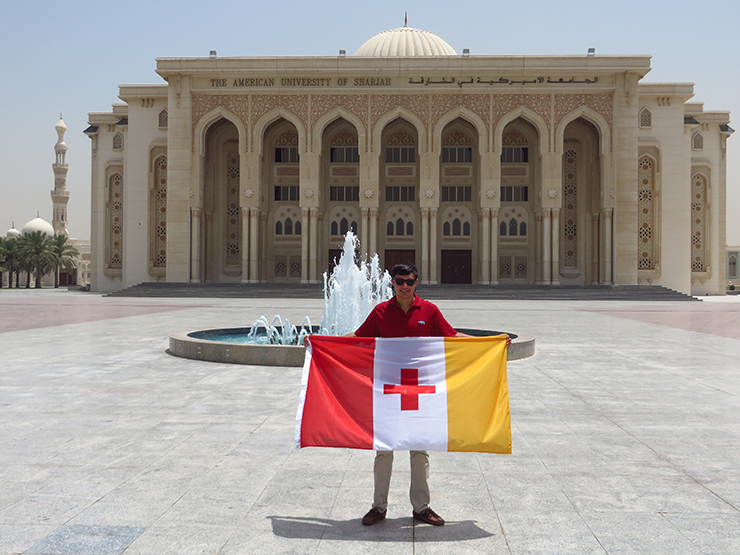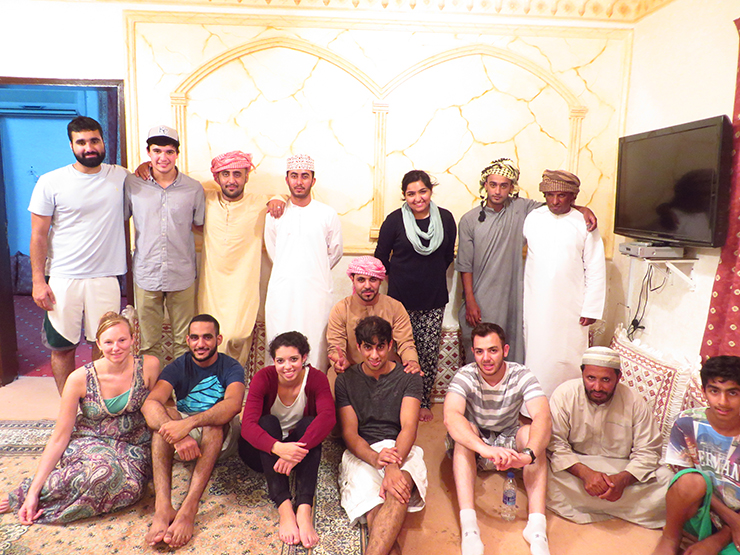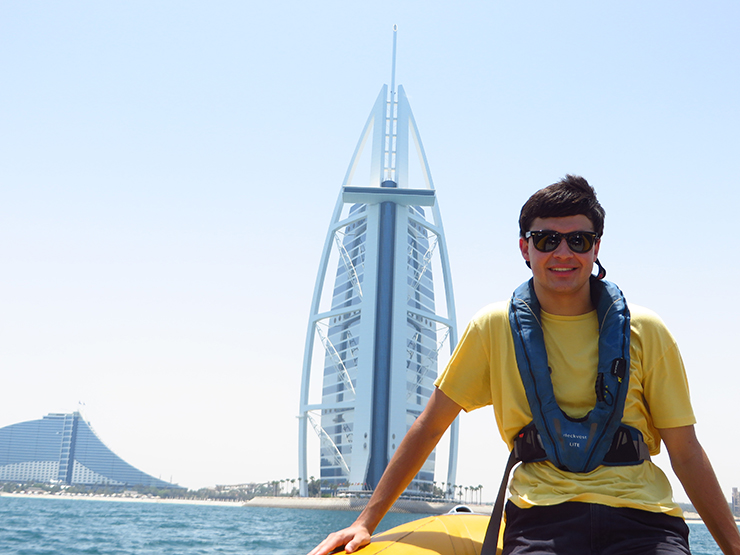Junior Zach Schwermann has majors in International Relations and Middle Eastern Studies and has tacked on two minors as well – Arabic and International Business. So it makes sense that he would be drawn to the Intensive Arabic Language Seminar in the United Arab Emirates. Along with a better knowledge of speaking Arabic, Zach learned a lot about the culture of the Middle East, including how U.S. food chains adapt to meet Islamic dietary restrictions and how Muslims celebrate their holy days.
Hot, sandy and dangerous; these are all stereotypical adjectives that people use to describe the Middle East. While some of these are indeed true (I experienced 112 degrees Fahrenheit once or twice!) some of them aren’t (Dubai has a lower crime rate than most modern, Western, industrialized countries). My experiences while studying abroad in the United Arab Emirates allowed me to confront these stereotypes first hand, and by doing so I was able to greatly expand my understanding of the Middle Eastern way of life and the people that live it. My name is Zach Schwermann, and I received the Honors College Study Abroad Grant, which helped to fund my study of the Arabic language at the American University of Sharjah, in Sharjah, UAE. Prior to my trip, I had studied Arabic at the University of Arkansas since my freshman year, but this seven-week trip allowed me to grow my understanding of both the language and the people who speak it more than the prior two years at Arkansas had, combined.

Myself and my fraternity’s flag (Kappa Alpha Order) in front of the main administrative building at the American Univeristy of Sharjah
Landing in Dubai’s international airport was a surreal experience that had me feeling nervous, yet also anxious, because I was stepping into a world that I thought was astronomically different than the one I had just left behind. It turns out I was wrong, because while there were many differences about the culture of the UAE, there were many similarities too. This is because, just like back at home McDonalds was on every other corner, IHOP was always there for late-night breakfast cravings, and all of the teenagers loved to flaunt their cars and were obsessed with selfies. However, the strictness of Islamic law during the holy month of Ramadan (not being able to publicly eat or drink during the day) and the vast amount of wealth being publicly shown, made this homelike world feel like Mars. That, though, is what I loved about the UAE, because while it felt like home, it really wasn’t, and it allowed me to see that the incorporation of American culture into a foreign country was possible, if the society was allowed to make it their own. For example, Pizza Hut: Pizza Hut was very popular in the UAE, but while pepperoni, bacon, and ham are essential ingredients in the US, they were replaced with chicken, in about every form possible, because the consumption of pork is not allowed in Islam and the UAE is a predominantly Islamic society.
In addition to the reduction in the usage of pork, Islamic culture was very prevalent during the holy month of Ramadan where Muslims fast from sunrise to sunset. The month of Ramadan is one of the most important times during the Islamic calendar, so the rules of fasting were taken very seriously in a country that was usually very relaxed to the often non-Islamic, Western ways. While it was still possible to find places to eat and drink during the day, they were often fenced off and hidden from public view, which was a very weird feeling in a mall food court that is usually very open and bustling with people. Another cultural aspect that was different from America was the large variety of people from all around the world. Throughout my trip I counted, hearing 12 different languages ranging from Urdu (a Pakistani language) to Russian. Urdu was surprisingly the third most-used language in the UAE (following English and Arabic) and was the foreign language I encountered the most while abroad. This is because most of the blue collar work force, of taxi drivers and restaurant workers, come from Pakistan and often knew only Urdu and broken English. However, this did not hinder my ability to grow in my Arabic language skills, because I still found many opportunities to speak the language outside of class.
My favorite experience speaking Arabic happened on a beach in Oman, during a trip that some of my classmates and I decided to take on our last weekend abroad. While in Oman we got the unique experience of getting a personal tour of the country by some natives who were friends with one of my classmates. They introduced us to some of their friends who happened to be Bedouins, who lived in the Omani desert. They met us for dinner out on that beach and I was able to talk with them, in Arabic, about their views of America and what they liked to do for fun. This ended up being one of the coolest experiences of the entire trip and the best usage of my Arabic skills while abroad. These experiences are only a small sampling of my entire seven-week adventure, but I believe that they represent the overall experience well because they show both the similarities and differences of the UAE and how I was able to use what I was learning in the classroom to enhance my study abroad experience.
While the experiences I had there were limited to a finite time period, the lessons I learned gave me an infinite amount of possibilities of how I can further expand my understanding of the Middle East and hopefully be able to go back, either during college or afterwards for a job opportunity.


